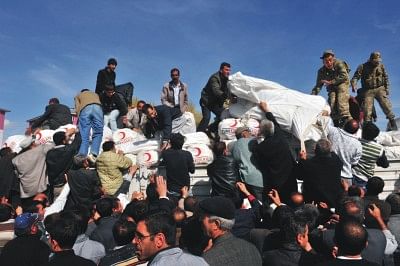Turkey quake death toll 279

Residents loot tents from Turkish Red Crescent truck a day after a powerful earthquake in Ercis, province of Van, in eastern Turkey, yesterday. Story on page 20.
Thousands of people are facing a second night in freezing temperatures after Sunday's 7.2-magnitude earthquake in a mountainous area of eastern Turkey.
Rescue teams have continued to search for survivors under the rubble of hundreds of collapsed buildings.
Deputy Prime Minister Bulent Arinc said 279 people had died and 1,300 were injured, most of them in the cities of Van and Ercis, near the Iranian border.
With hundreds of people missing, the death toll is expected to rise.
Ercis, population about 75,000, has been the worst hit, with some 80 collapsed buildings.
The BBC's Daniel Sandford, in Ercis, says most of those destroyed buildings are apartment blocks with dozens of people missing at each site.
Both Ercis and the larger city of Van, about 100km (60 miles) to the south, lie on a high plateau surrounded by snow-capped mountains.
Temperatures at night, with winter closing in, dip below freezing.
Thousands of people whose homes have been destroyed or badly damaged face a second cold night in the open.
Rescuers say the chances of those still alive beneath the rubble surviving another night are fading, our correspondent reports.
'PRIMITIVE TOOLS'
Earlier, Interior Minister Idris Naim Sahin said 169 people had died in Ercis and 96 in the Van area.
Prime Minister Recep Tayyip Erdogan's office said 970 buildings in the earthquake zone had been destroyed.
Erdogan visited the area on Sunday and said many villages made of mud brick had been almost completely destroyed.
In the larger towns, cranes and heavy equipment are lifting slabs of concrete while rescue crews cut through steel bars and beams and shift rubble, trying to find survivors.
Some of the rescue workers have complained of a lack of adequate equipment, said the Hurriyet Daily News.
"We are working with primitive tools, we have no equipment," one rescuer told the Turkish newspaper.
Despite the difficulties, five people were pulled from the ruins of one collapsed building in Ercis yesterday after one of them called for help on his mobile phone, Anatolia news agency said.
Another man was rescued later yesterday, some 30 hours after the earthquake struck.
Some 2,400 rescue workers are involved in the relief effort, as are 680 medics, 12 rescue dogs and 108 ambulances - including seven air ambulances, the prime minister's office said.
The Turkish Red Crescent has set up tent encampments in Van and in a sports stadium in Ercis, but many thousands of people were facing a second night in the cold.
Some survivors in the ethnic Kurd areas complained that not enough help was reaching them.
"Tents will not be enough - we do not have food, no rescue teams have reached here yet," said Serif Tarakci, an official from the village of Halkali, about 50km (30 miles) from Van.
"It's cold at night, everybody is outside and we're freezing here," the New York Times quoted him as saying.
Another resident of Van said that even tents were in short supply.
"All the nylon tents are in the black market now," Ibrahim Baydar, a 40-year-old tradesman from Van, told Reuters news agency.
"We cannot find any. People are queuing for them. No tents were given to us whatsoever," he said.
Prime Minister Erdogan thanked other countries for their offers of help, but said Turkey could cope with the disaster on its own.
The earthquake struck at 13:41 (10:41 GMT) on Sunday at a depth of 20km (12 miles), with its epicentre 16km north-east of Van in eastern Turkey, the US Geological Survey said.
About 200 aftershocks have hit the region, it added, including one of magnitude 6.0 late on Sunday.
Turkey is particularly vulnerable to earthquakes because it sits on major geological fault lines.
Two earthquakes in 1999 with a magnitude of more than 7 killed almost 20,000 people in densely populated parts of the north-west of the country.

 For all latest news, follow The Daily Star's Google News channel.
For all latest news, follow The Daily Star's Google News channel. 



Comments